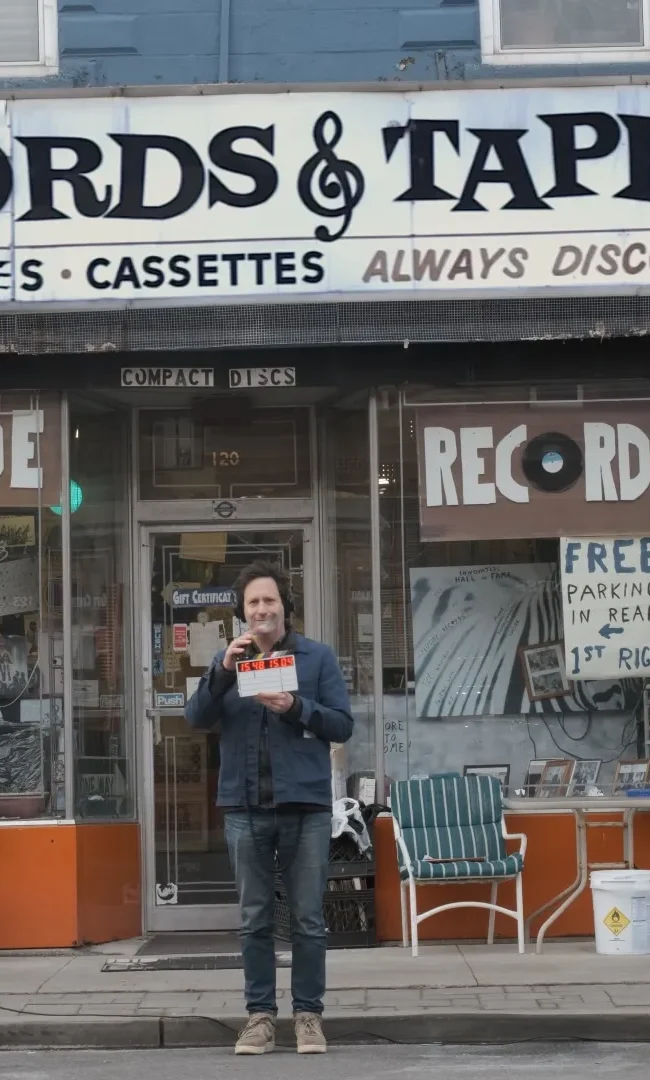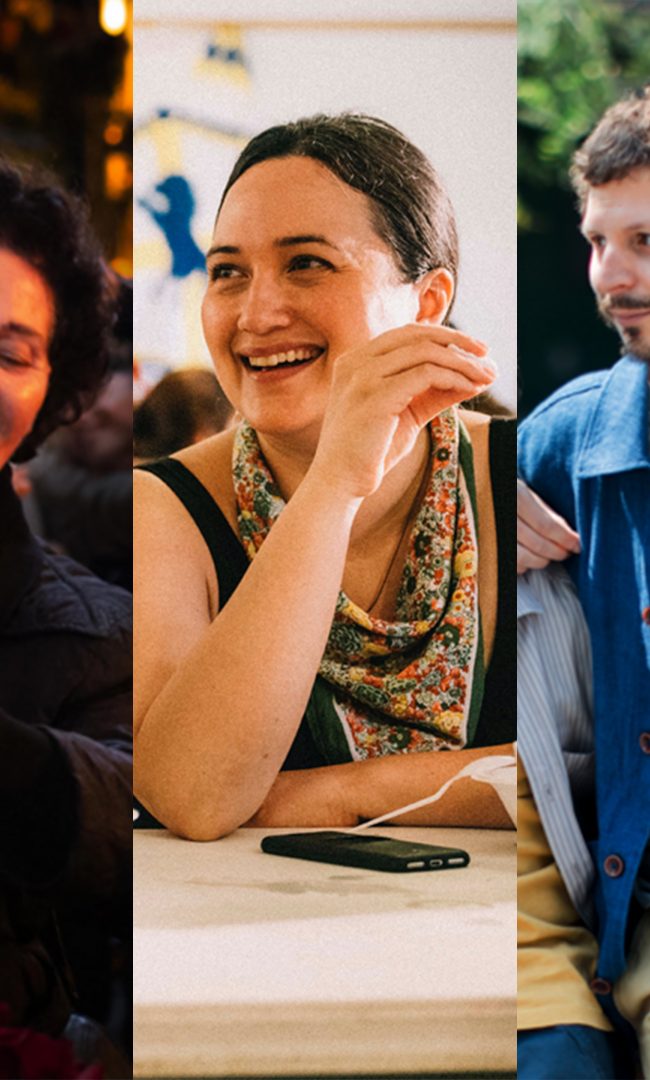A Conversation with Midge Costin (MAKING WAVES: THE ART OF CINEMATIC SOUND)
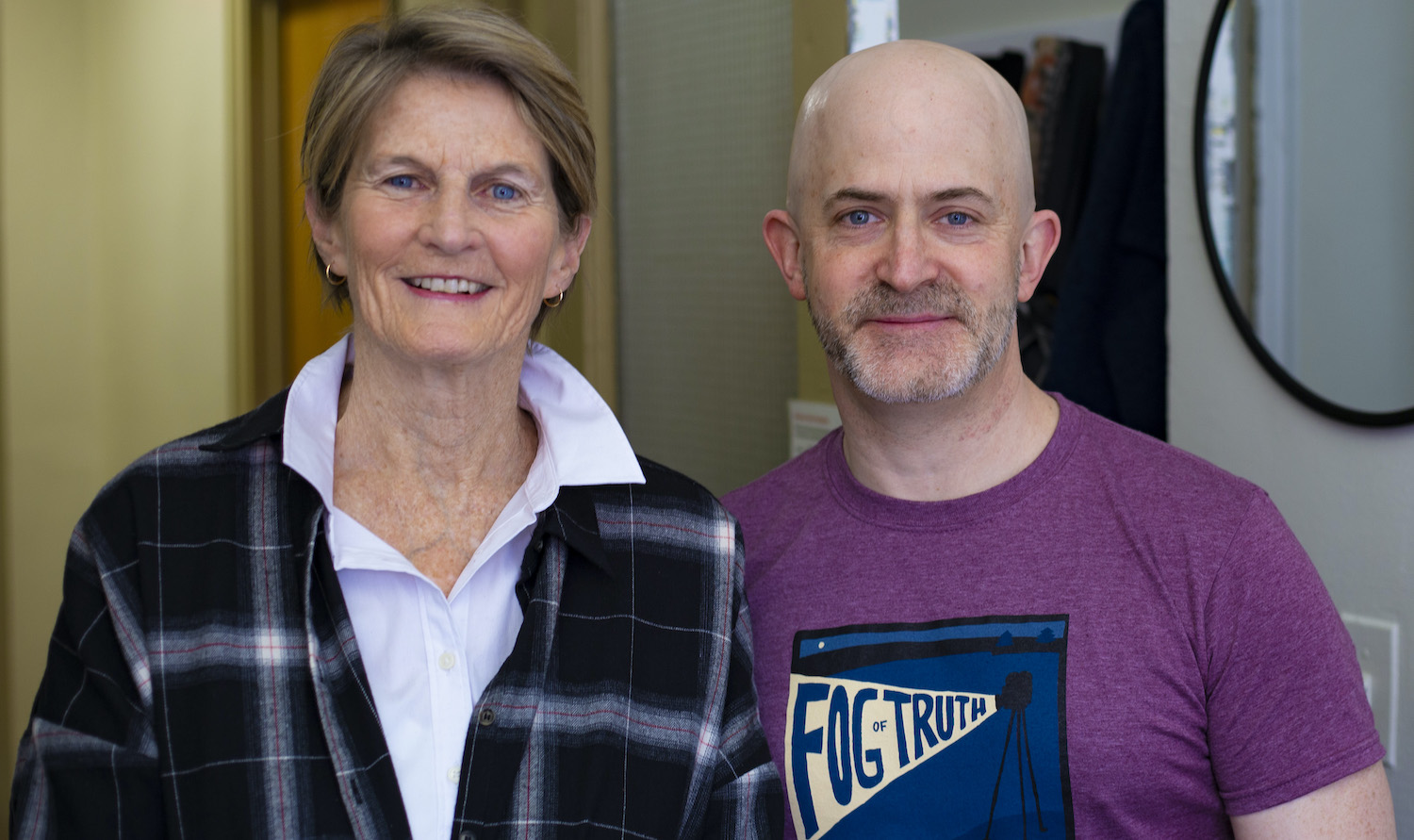
I met with director Midge Costin on Monday, April 29, 2019, at the 2019 Tribeca Film Festival, to discuss her new documentary Making Waves: The Art of Cinematic Sound (which I also reviewed). In the film, Costin provides a comprehensive overview of the history, art and craft of sound design for movies. It’s a must-see for cinephiles and audiophiles, alike. Here is a condensed digest of our conversation, edited for length and clarity.
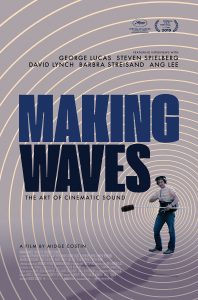 Hammer to Nail: You were, in the 1990s, a top sound designer yourself. Could you talk about your decision to move into academia starting in 2000?
Hammer to Nail: You were, in the 1990s, a top sound designer yourself. Could you talk about your decision to move into academia starting in 2000?
Midge Costin: That was an easy choice to move from Hollywood to academia. I’ll tell you why: I love teaching, it’s my first love, and I taught swimming lessons starting in eighth grade and I taught all the way through college. Everything I ever did I taught, and I didn’t realize it. I was just like a natural teacher, so when I started working in sound. The funny part was when I was in film school, I didn’t like sound. It scared me, the technology; they were teaching it from a technical perspective, not story. I came out wanting to edit, and then I lowered myself into the sound job when I needed money, when I was finishing a short film.
So, I was kind of a reluctant sound editor, and then born-again sound person, because I discovered the impact that you can make with sound. I worked on these big action/adventure movies and worked my way up. I don’t even like that genre, but sound is so important in it and that was so fun, and also it was just the beginning of 5.1 sound, which was so exciting. I did Days of Thunder, with the cars. The other reason I even stayed in sound is because I was one of the few women doing sound effects. Women do more dialogue and Foley editing, but they don’t do effects. That was so exciting to do that, and I love the people I work with, which is partly what this movie is about.
But after a while, honestly, one day I was working on something – I don’t even want to say, I don’t want to insult anybody – I was working on a movie that I thought was ridiculous, and I walked out and I remember this because I walked into a friend’s room and she reminds me. I walked into her room and I said, “Not only am I wasting two hours of people’s lives, but these are sexist, racist, whatever.” I mean, I go to movies for somebody to tell me the meaning of life. I didn’t realize that until about two years ago. Tell me your meaning of life, what do you think it is? That’s why I love going to movies. I don’t like horror movies. I love somebody to tell me a different perspective or tell me their perspective on life.
So, because I love to teach so much, I was teaching a class at night if I could, but it was so hard with the hours that you keep, and they were losing the Head of Sound at USC Film School, and the Dean said, “We’d like you to go up for this tenure position.” So, to get tenure right from the get-go, that was amazing! It’s so ideal. And another reason I wanted to teach was so that I could give students a leg up so they wouldn’t be panicked like I was when I did sound. Literally, I would get panic attacks. I would have to ask this friend of mine who did radio, who was Swedish, he was like an NPR kind of reporter, and I would always ask, “Help me, I’m doing sound.” And so I thought I can tell them how to do sound and they can do it on films that are better, or I would rather see, than the ones I work on. Though of some of the ones I worked on, I have to say I loved Crimson Tide, and I also did this one, Imagine: John Lennon, which blew me away.

Filmmaker Midge Costin
HtN: (laughs) I should point out that I’m surprised that you don’t think we can find the meaning of life in films like Con Air and The Rock, which you also worked on. However, I will say that I actually really enjoyed The Rock. It’s one of the few Michael Bay films that I watched and emerged from happier than I was at the beginning. It’s a lot of fun.
MC: A student had to tell me, when I was probably trashing my own work or something, or saying, “Oh, I hardly show my work”, and the student said, “Midge, they’re a roller-coaster ride. They’re campy.” I was like oh, really? I didn’t get that.
HtN: Well, The Rock is certainly very campy, which is one of the reasons I really, really enjoyed it, and the sound work in all of these films, whatever one may think of them, is astounding. Congratulations on all that.
MC: Thank you. That was always satisfying. We had good laughs, because we thought they were so ridiculous, but The Rock I didn’t get.
HtN: Well, I enjoyed it, and I can’t say that for all of that director’s work. So, this is a field that has long cried out for a documentary about it. First we had Visions of Light, in the ’90s, about cinematography, and later on we had The Cutting Edge, about editing. So, Midge, what took you so long?
MC: (laughs) Yes, I know, really. You know what took me so long? I started this around 2000, 2002, 2004, and I talked to Wendy Apple, who was doing The Cutting Edge. Someone said, “Oh, Wendy’s doing the editing version of it.” And so I called her up and said, “Wendy,” because I used to teach with Wendy, and so I started to ask her. She spent two years getting rights for the clips. There was no Fair Use, and I had just had an aggressive form of breast cancer and was going through this thing, and I thought life is too short. I love making films, I love working on films, but to take two years to do producing stuff, it was like that was not for me.
Bobette Buster, my producing partner, came to me because she went to [sound designer] Gary Rydstrom because she saw the need for the film. She knew about Fair Use – actually she helped argue that case at the Supreme Court level – and so she asked Gary if he would be involved and she said that he said, “If you got Midge Costin involved, I would be.” Which is like, that is such an honor. To Gary, thank you. I love Gary, he’s such a sweet guy.
That’s how it all began, and then it took us nine years, and that’s because it’s that thing about sound, I think it’s so subliminal that people don’t get it. Now they’re getting it more and more because everyone’s saying, “Oh, I’d love to see that sound,” and students are coming in now and saying, “I want to do sound, because it’s what I know least.” I had director Ryan Coogler for a student, and it was because he knew he didn’t know sound, so he did sound in this advanced graduate film before he directed, you know. Talk about sweet guys, oh my God.
HtN: Well, the thing is – and you don’t need me to tell you this because you have far more experience in the field than I do – audiences will tend to forgive poor picture if it has good sound, but the reverse is generally not the case.
MC: I heard Michael Moore say that when he came to visit USC. I’ve heard so many people say that now that it must really be true. That’s great, because people now have more awareness. I wonder if it’s because everyone’s got their pods in their ears, everybody’s listening, they’re watching things on smaller screens, and what brings the emotion and brings the movie home, the story, is the sound, and everyone’s more aware of it. Yeah.
HtN: Indeed! So, I now understand why Gary Rydstrom is in the film, beyond just being one of the titans of his industry, but how did you make the other choices? You have three main protagonists – you also have many other talking-head interviews – Walter Murch, Ben Burtt, and then Gary Rydstrom. How did you narrow it down to those three?
MC: Oh my God, that was a hard one. Do you know we did 90 interviews, because I figured there was a series in there? While we were doing it, we got everybody, so it was hard to leave out people like Randy Thom. I think it was because historically, where were the points? There’s King Kong back in 1933, and luckily there was an interview of Murray Spivack, and then Walter Murch with Apocalypse Now, oh my God. And you know, Walter Murch on that film, they created 5.1 sound, essentially surround. He had never worked on anything but a mono film. So, Walter’s a clear thing, also using sound as metaphor, just like so beautiful: The Godfather with the train and the killing in that movie. He’s just so brilliant.
And then Ben Burtt with Star Wars. The amount of time that he got to go out and record things before they started to shoot, a year before they started to shoot. George Lucas knew the importance of sound, and he also knew the importance of sound for those creatures. They really thought – it’s one of my favorite parts in the movie – they really thought this movie could bomb if they didn’t understand it, so the characters needed to have personality, they needed to be understood. Then Gary Rydstrom, I just think how he took everything beyond that, especially with all the effects in, say, Jurassic Park, but also Pixar and starting there creating sounds, and really making these characters have feeling. It was really fun to do that, and on that very first movie, what’s the Pixar movie with the…
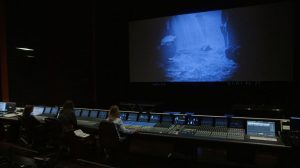
A still from MAKING WAVES: THE ART OF CINEMATIC SOUND
HtN: Well, Toy Story is the first one.
MC: Yeah, but the first one really was the…
HtN: Luxo Junior?
MC: Luxo Junior, yeah. That’s really fun, so we really take time to show that because it’s really about getting in there and listening to sounds and then finding the emotional elements.
HtN: Indeed, and on the DVD and Blu-ray of Wall•E, there’s a wonderful behind-the-scenes film that I’ve watched on how they did the sound design for that, which is just beautiful. So, you have a lot of diverse other voices in the film, that take us away from the Lucas, Spielberg and Pixar bias. How did you decide who to include? Because you have the three main guys, and then you said you made 90 interviews, so how did you narrow it down to the ones who end up in the movie?
MC: You know, that came down to what directors did we have, so that they could talk about their relationship and how they worked together. One of the things I was sorry about is I didn’t get my New Yorkers, like Martin Scorsese, Spike Lee, and the Coen brothers. Right? Also Kathryn Bigelow, I really wanted. I mean, they have two Academy Awards for her films, and I use her films all the time. I use Hurt Locker, just that opening, all the time to just even start off talking about sound design and sound in films, and she said yes, and then I don’t think she likes being interviewed. I think she gets the thing of “the woman angle,” and she was afraid of that, but her sound designer gave us a great interview and I was so looking forward to that. But I think it was really tough. Talk about killing your babies, but I think it came down to what directors do we have and what did they say. What do we want to talk about at that time?
HtN: I agree the Coen brothers would have been wonderful. The sound in their films! I use scenes from their films all the time in class. Barton Fink has some of the greatest sound effects ever. Yeah, that would have been a nice addition, but you have lots of great voices. So, did you have any concerns, given what’s happened in the past couple of years to the reputation of this person, of including John Lasseter? Obviously, he’s seminal to Pixar, but how did you navigate that?
MC: Yeah, that was a tough one. What we did is we went around and we asked people, and also we did take him out more. We tried to take him off the screen as much as we could, but you know that’s a really tough thing. The Me Too movement is so important, just finally that women are being heard and understood in this whole thing. We all took that seriously, being women filmmakers, and so we went around and we asked people, and I think it was tough, but it’s a part of history. It’s a part of film history and we still wonder, we question.
HtN: Yes, it’s tough to tell the story of Pixar without John Lasseter, whatever he’s done. I appreciate how difficult that must have been to navigate that. Now, I really love the graphic wheel that you have that sort of shifts forward as we enter different parts of the sound-design process. How did you devise that device?
MC: That was great. It was Teri Dorman, my friend who’s I think one of the best sound editors in the world, without a doubt. She used the term “circle of talent.” Circle brings that to mind, and then we also had the idea of … Walter Murch gives us the idea of doing sound in different categories. He said it’s like an orchestra, and so we had that idea and we melded those two together, and then just how I teach is like breaking things out.
It might have been Bobette who came up with the idea of the wheel. I can’t remember, but I know we were with the editor, our brilliant editor, David Turner, and then Bobette was there, our supervising editor Tom Miller was there, and I was there, and we just started talking about that idea of circle of talent. How do we get the circle of talent in? Because that’s how we add today’s people, and also I definitely wanted to get in the different types of sound editing. I wanted to be able to break that down, and it just kind of popped up between, I think, all four of us.
HtN: Well, I really like it, and I really enjoyed your film and I want to congratulate you on it and thank you for making it because, as I said at the start, it’s about time we had a film about sound design.
MC: Thank you, Chris. I appreciate your interest.
– Christopher Llewellyn Reed (@ChrisReedFilm)
Like what you see here on Hammer to Nail? Why not pay just $1.00 per month via Patreon to help keep us going?








